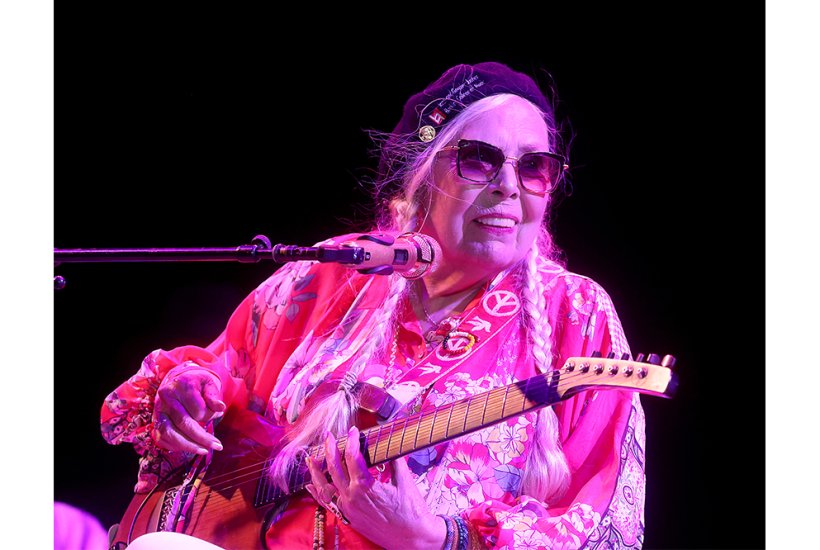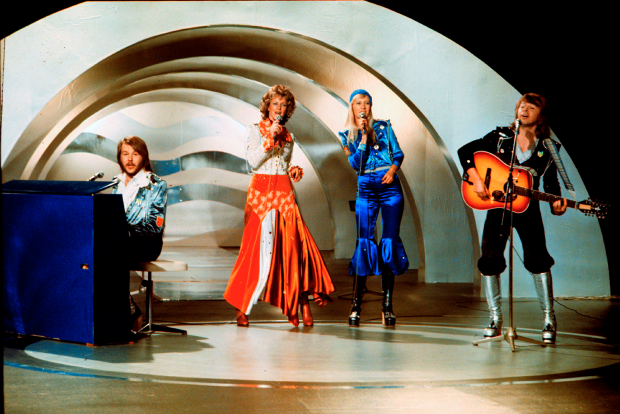There’s always been something at once girlish and steely about Joni Mitchell, the stellar Canadian whom Rolling Stone called ‘one of the greatest songwriters ever’. As Radio 4’s Verbatim programme in honour of her 80th birthday reminds us, a stubborn hopefulness has carried her through turbulent times. Perhaps growing up in Saskatchewan, where winter temperatures drop to –30°C, put an early stiffener in her soul. When she contracted polio, aged nine, her mother braved the hospital ward in a mask to bring her bedridden daughter a small Christmas tree, but little Joni made a promise to the tree that she would walk sufficiently well again to be allowed back home for Christmas. This she managed. Before hitting ten, she took up smoking.
At 20, while a penniless art student, she realised she was pregnant by an ex-boyfriend: a disastrous event in the days when, in her words, an unmarried mother was seen as ‘a criminal, a fallen woman’. She didn’t tell her parents, but instead gave birth to her baby daughter – later put up for adoption – in a Toronto hospital surrounded by disapproving staff, where ‘a lot of human ugliness came at me’. A doomed first marriage to a fellow folk singer, Chuck Mitchell, was forged and broken in just over a year. All was grist to the songwriting mill. ‘Pain is a teacher,’ she says here. ‘One of the best actually.’ She translated its lessons expertly: so many of her most famous songs – ‘Little Green’, ‘A Case of You’, ‘River’, ‘Coyote’ – are threaded with shimmering melancholy.
Mitchell’s story is largely told here in her own words, assembled from various interview clips spliced together and interspersed with songs. The effect is compelling but slightly disorienting, as the lighter, clean-cut tones of young Joni jostle with the more gravelly reflections of older Joni, without the listener having much idea of the shifting contexts of recordings. Still, the format succeeds in sketching a vivid portrait of this doggedly independent character, who from an early age was acutely attuned to music and its emotional vibrations. The first time she heard Edith Piaf on the radio as a child, she said: ‘I had goose bumps, I think I probably dropped my cake fork.’
In contrast to today’s young stars, terrified of cancellation, the joyous and irritable Mitchell has rarely seemed to care much what anyone else thinks. She was never a feminist, she said bluntly, because so many seemed to be ‘man-haters’ and ‘I was constantly in the company of men, usually large entourages of men’. One gets the feeling that was how she liked it. Mitchell seemed as keenly attuned to male erotic signals as key changes, and wrung a similar amount of music out of them. Her most frequently discussed romances were with fellow musicians Graham Nash, James Taylor, David Crosby and Leonard Cohen: all generated memorable songs. While recording Court and Spark, she asked the studio to set her up opposite the drummer John Guerin. The ensuing relationship went on for years.
‘Society has changed all around me,’ she says. ‘People’s nervous systems are shot.’ Her own, remarkably, has survived severe depression, and health complications that included a near-fatal brain aneurysm in 2015. Fans feared she would never play on stage again. But then she suddenly appeared at last year’s Newport Folk Festival, her voice deeper but still melodic, her expanse of white teeth intermittently bared beneath her broad, high cheekbones in flashes of joy. Fellow performers clutched their hearts. The scene was oddly moving.
As the escalating agonies of war in the Middle East dominate the headlines, The Shadow: Hamas’s Hidden Commander goes to the heart of the matter, investigating who within Hamas organised the horrifying 7 October attacks upon Israel, and how much others knew about it. The host Chloe Hadjimatheou points at a hardened but elusive figure called Mohammed Deif, the commander of the organisation’s military wing, who hasn’t been seen in public for almost 20 years but has attained almost mythic status among militant Palestinian youths. On Hamas TV in the aftermath of the attacks, Deif – represented by a shadow – announced that ‘the rage of our people and nation is exploding’. An earlier Israeli strike left him permanently injured and killed his wife and two children. Now, it’s said, he is so paranoid that he will eat only food prepared by his own mother.
The assault on Israel – which broke through security at the heavily fortified Erez crossing – took considerable planning. So why didn’t Israeli intelligence services see it coming? It seems that only a very small number of Hamas military commanders knew the full details; publicly, Hamas had recently seemed to turn away from militancy and towards consolidating power in Gaza. A Gazan professor of political science here says that events took him completely by surprise: ‘Hamas has succeeded in deceiving everyone.’
There was, however, also a worrying complacency on the part of the Israeli government. An Israeli intelligence officer said they had noted Hamas using drones and gliders, practising invasion from sea and land, but believed any attack would be easily containable. Deif has now beckoned in unimaginable misery for civilians in both Israel and Gaza. But what is his end game? On that, no-one has a clear answer.
Got something to add? Join the discussion and comment below.
Get 10 issues for just $10
Subscribe to The Spectator Australia today for the next 10 magazine issues, plus full online access, for just $10.
You might disagree with half of it, but you’ll enjoy reading all of it. Try your first month for free, then just $2 a week for the remainder of your first year.















Comments
Don't miss out
Join the conversation with other Spectator Australia readers. Subscribe to leave a comment.
SUBSCRIBEAlready a subscriber? Log in